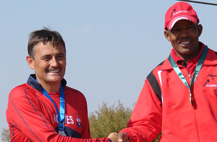 |
|
DB Prinsloo and a fellow athlete at the Free State Cross Country Championships.
Photo: Supplied
08 June 2012
|
DB Prinsloo has been appointed as Director of KovsieSport, effective from 1 April 2012. He has been acting in this position since 2010.
Apart from leading this division for some time, DB has been involved as a sport manager at KovsieAthletics since 2003. “Athletics is my speciality sport, but during the past two years as acting director, I have managed to create a balance and I was able to divide my time in order to serve all the sporting codes.”
He is very excited about his appointment. “It’s such a privilege. I have been a Kovsie since my first year in 1982, and I am really proud to be able to go the distance,” he says.
Regarding his vision for KovsieSport, DB says, “I would like to see Kovsies become the first choice university in South Africa for students who are interested in sport – be it performance sport or recreational sport.”
He finds students’ involvement in sport at university important. “I would like to see us increase our excellence, something we are already working hard to achieve. Participating in sport is a lifestyle choice and I would like to see all students participating in our recreational sporting activities. A healthy body is home to a healthy spirit,” he says.